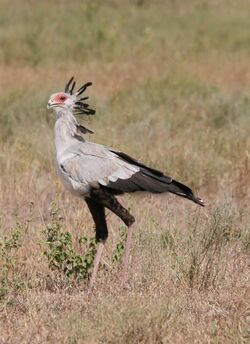Biology:Sagittariidae
| Sagittariidae | |
|---|---|

| |
| Sagittarius serpentarius | |
| Scientific classification | |
| Domain: | Eukaryota |
| Kingdom: | Animalia |
| Phylum: | Chordata |
| Class: | Aves |
| Order: | Accipitriformes |
| Family: | Sagittariidae |
| Genera | |
|
At least 4 genera (see text) | |
Sagittariidae is a family of raptor with one living species—the secretarybird (Sagittarius serpentarius) native to Africa—and a few fossil taxa.[2][3][4]
This single extant species has affected the fossil record of the group by ‘pulling’ the temporal range of the family to the present, an artifact called the Pull of the recent.[4]Template:Relevant
German naturalists Otto Finsch and Gustav Hartlaub established the taxon name as a subfamily—Sagittariinae—in 1870. Although their term postdated Gypogeranidae of Vigors (1825) and Serpentariidae of Selys Longchamps (1842), the genus name Sagittarius (described in 1783) had priority over Gypogeranus Illiger, 1811 and Serpentarius Cuvier, 1798.
Genera
There are at least four genera:[2][3]
- †Amanuensis Mourer-Chauviré, 2003[3]
- †Amphiserpentarius Gaillard, 1908
- †Pelargopappus Stejneger, 1885
- Sagittarius Hermann,1783
The genus Pelargopappus is known from Miocene deposits in France. The genus Amanuensis is known from Miocene deposits in Africa.[3][5]
References
- ↑ Mourer-Chauviré, Cécile; Cheneval, Jacques (1983). "Les Sagittariidae fossiles (Aves, Accipitriformes) de l'Oligocène des phosphorites du Quercy et du Miocène inférieur de Saint-Gérand-le-Puy". Geobios 16 (4): 443–459. doi:10.1016/S0016-6995(83)80104-1. Bibcode: 1983Geobi..16..443M.
- ↑ 2.0 2.1 "Family Sagittariidae (Secretary bird)". Paleobiology Database. Fossilworks. http://fossilworks.org/?a=taxonInfo&taxon_no=39321.
- ↑ 3.0 3.1 3.2 3.3 Cécile Mourer-Chauviré (2003). "Birds (Aves) from the Middle Miocene of Arrisdrift (Namibia). Preliminary study with description of two new genera: Amanuensis (Accipitriformes, Sagittariidae) and Namibiavis (Gruiformes, Idiornithidae)". Geology and palaeobiology of the Central and Southern Namib. Vol. 2: Paleontology of the Orange River Valley. Geological Survey of Namibia, Memoir 19. pp. 103–113. http://the-eis.com/elibrary/sites/default/files/downloads/literature/Birds%20from%20the%20Middle%20Miocene%20of%20Arrisdrift.pdf.
- ↑ 4.0 4.1 Sahney, Sarda; Benton, Michael (2017). "The impact of the Pull of the Recent on the fossil record of tetrapods". Evolutionary Ecology Research 18: 7–23. https://cpb-eu-w2.wpmucdn.com/blogs.bristol.ac.uk/dist/5/537/files/2021/01/2017Sahney.pdf.
- ↑ Mayr, Gerald (2016). Avian Evolution: The Fossil Record of Birds and its Paleobiological Significance. John Wiley & Sons. p. 201. ISBN 9781119020769. https://books.google.com/books?id=UNqTDgAAQBAJ&pg=PA201.
Wikidata ☰ Q2346527 entry
 |

